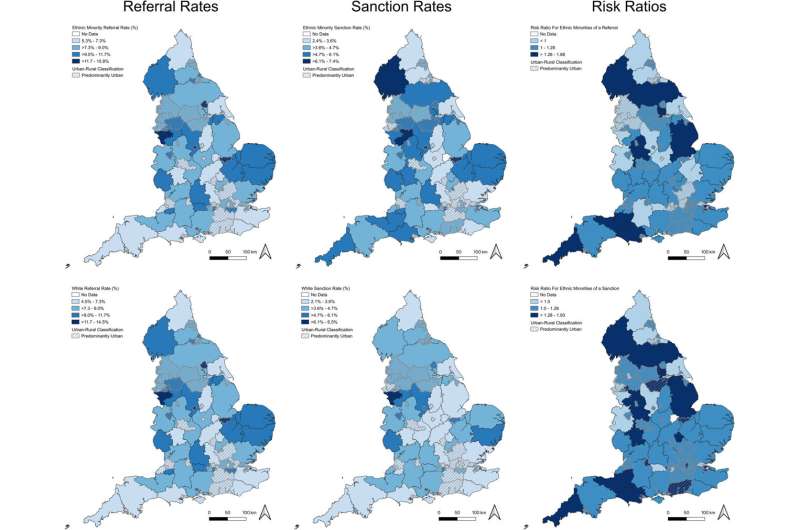This article has been reviewed according to Science X's editorial process and policies. Editors have highlighted the following attributes while ensuring the content's credibility:
fact-checked
trusted source
proofread
Racial disparities in the application of welfare sanctions in England

Ethnic minority claimants living in rural areas of England are more likely to face sanctions when claiming Jobseeker's Allowance compared to their white counterparts.
Academics from Cardiff University used Department of Work and Pensions (DWP) data to analyze the total number of sanction and referral decisions made in each local authority (LA) for different ethnic groups over a period of seven years.
The study, published in the journal Transactions of the Institute of British Geographers, reveals specific hotspots where racial disparities are most marked—the majority of which are in rural areas.
In Cumbria, Black or Black British claimants are almost three times (2.94) as likely to be referred for a sanction than their white counterparts. They are twice as likely to be sanctioned in the Isle of Wight and Poole, and more than 1.5 times more likely in York, North Yorkshire, East Riding and Cornwall.
In Yorkshire and The Humber, claimants with a mixed ethnic background are 1.71 times more likely to be sanctioned in rural areas than their white counterparts, while in urban areas it is 1.47 times more likely. While Black or Black British claimants living in urban parts of the region face an equivalent risk of sanctions as their white counterparts, those living in rural areas are 1.47 times more likely.
Lead author Dr. Andrew Williams, based at Cardiff University's School of Geography and Planning, said, "The results of our research are stark—and show claimants from racially minoritized backgrounds are more likely to be referred for a sanction by Jobcentre caseworkers and receive an adverse decision at the hands of institutional decision-makers.
"In rural England, the risk of being sanctioned is substantially higher for all groups, but especially for mixed heritage and Black/Black British claimants. Since ethnicity data has not yet been released for Universal Credit sanction decisions, the presented evidence offers critical insight into the potential persistence of racial injustice in the welfare sanction system."
Publicly available data from 2012 to 2019 was analyzed for the study. It was replicated at a national, regional, and county level to provide sufficiently large counts, allowing a more granular analysis of ethnic group disparities and geographical differences.
The paper notes that as part of its austerity program, the U.K. government tightened the conditions of welfare programs and intensified the use of financial penalties against welfare claimants during this time.
Dr. Williams added, "This is not simply an issue of legacy benefits. A recent poll of 809 Universal Credit claimants by Citizens Advice* shows racial disparities in sanction decisions continue: with 9% of white people reporting to have been sanctioned, compared to 17% of racially minoritized people.
"A growing body of evidence has shown the welfare sanctions system has led to higher levels of destitution, food bank use, indebtedness, survival sex and crime, and worsening mental health. Yet sanctioning has been proven to be ineffective in enabling people to enter and sustain paid work that lifts them out of poverty.
"Urgent policy attention is needed to investigate the reasons behind these worrying disparities."
More information: Andrew Williams et al, Racism and the uneven geography of welfare sanctioning in England, Transactions of the Institute of British Geographers (2024). DOI: 10.1111/tran.12677
Provided by Cardiff University




















